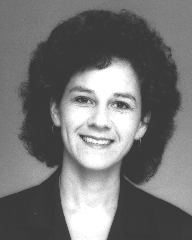Page 40
[Begin Tape 1, Side A]
Biagi: Mónica, I want to start today from about 1985, which is when we left off last time. That's when you first came to La Opinión. Your decision to come here, we talked about it a little bit, but I want to know more about that, why you decided to take this job after resisting it for so long.
Lozano: I had mentioned, the last time we talked, that it was a combination of factors, and everything seemed to come together just at that moment. The management of the company had been in the hands of my father, my brother, and my sister. Towards the end of '84, my sister left for good and moved to Italy, so it was my brother who was helping my father. My father had a medical condition that was quite serious. He was hospitalized, and my mother was very concerned. My brother was under pressure because he was running the paper by himself, no longer had my sister to help him, and my dad was quite serious at the time. So my family literally called me on the telephone, [and] asked me to come to Los Angeles so that we could talk, and asked me then to consider coming back.
I, at the time, had been in San Francisco for nine years. I had been doing a lot of different things on my own. As well as trying to learn a skill and get ahead professionally, I had also become involved in some of the community organizations in San Francisco, and saw a lot of different issues that I thought needed to be addressed and that weren't being dealt with properly. During the course of the years, I had conversed with a lot of friends who literally said to me, "If you really want to do something, why don't you consider going back to La Opinión where you have the ability to really make some changes. If you're concerned about issues, you have a vehicle in La Opinión that speaks to the population and that really has [the] ability to make some change."
So it was for those two reasons really, combined with some personal issues in my own life. My parents asking me to come back, my realizing that La Opinión was important in terms of the kinds of things that I wanted to do, and that I needed to consider that as an important professional opportunity, I decided that it might be the right time to come back.
I said yes. I came back, but I came back with reservations. I made it very clear to them that I wasn't sure if I wanted to, one, live in Los Angeles, and, two, whether or not it would appropriate for me to be at La Opinión, whether I would enjoy it and want to stay here, and also whether or not I would feel capable and qualified to come back into a newspaper, when I hadn't done daily newspaper work up until then.
Biagi: When you talk about issues that you felt were really important, what were some of the issues on your mind that you felt had been overlooked?
Lozano: I moved to San Francisco in 1977, and there was a new immigrant Latino population in San Francisco that was mostly a refugee population, people who had moved from both El Salvador and Nicaragua, as a result of civil wars in both countries. Since I was there at the time that there was this large influx of refugees, it was apparent that the city wasn't set up to accommodate them. Social services weren't being provided, the issue of language, the schools were substandard.

